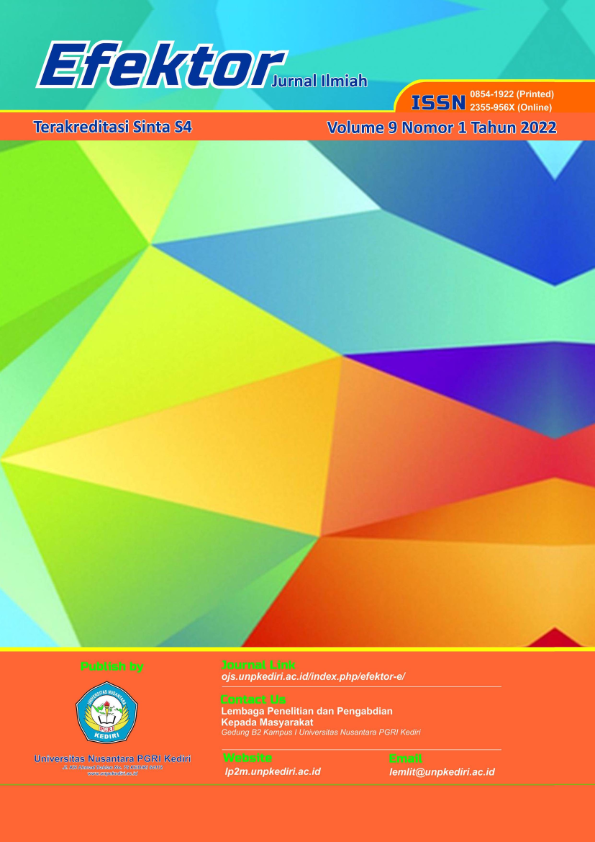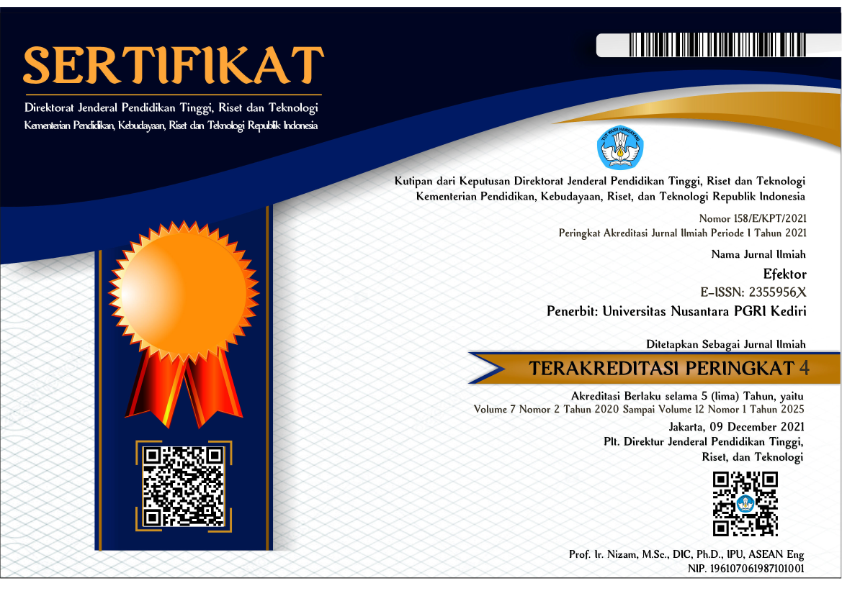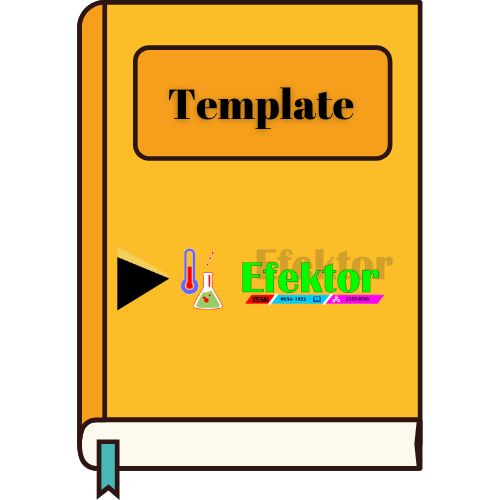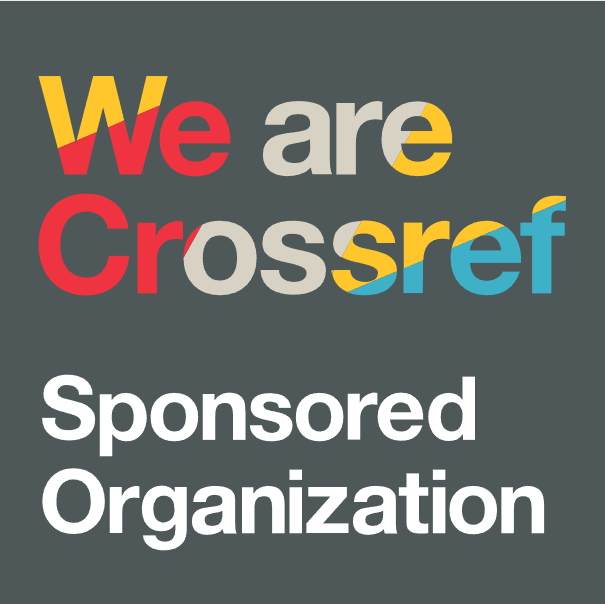Peran Iklim Organisasi Terhadap Perilaku Kerja Inovatif Dengan Perilaku Berbagi Pengetahuan Sebagai Mediasi (Studi Kasus Pada Industry Pariwisata)
DOI:
https://doi.org/10.29407/e.v9i1.16971Keywords:
Organizational climate, innovative work behavior, organizational climate, innovative work behavior, knowledge sharing behaviorAbstract
This study aims to examine the predictive role of organizational climate in innovative work behavior (IWB) during the COVID-19 pandemic with knowledge sharing behavior as a mediator between the two. These variables were chosen because they are assumed to have an effect on business continuity in the tourism industry during the pandemic. This research method is a cross-sectional quantitative research on individuals who work in the tourism industry, both government and non-government institutions. The study was conducted on selected sample of 84 employees whose jobs are tourism-related across the country. The Hayes Macro Process mediation test was conducted to test the hypothesis. The results showed that knowledge-sharing behavior plays a significant role in mediating the relationship between organizational climate and innovative work behavior. rIt is suggested that the knowledge sharing behavior does not become a mediator between organizational climate and IWB because of the possibility that it can stand alone as a predictor variable. The process of examining employees' perceptions of their climate and its impact on innovation work behavior takes a relatively long time
References
Akhavan, P., Hosseini, S. M., Abbasi, M., & Manteghi, M. (2015). Knowledge-sharing determinants, behaviors, and innovative work behaviors: An integrated theoretical view and empirical examination. Aslib Journal of Information Management, 67(5), 562–591. https://doi.org/10.1108/AJIM-02-2015-0018
Akram, T., Lei, S., & Haider, M. J. (2016). The impact of relational leadership on employee innovative work behavior in IT industry of China. Arab Economic and Business Journal, 11(2), 153–161. https://doi.org/10.1016/j.aebj.2016.06.001
Akram, T., Lei, S., Haider, M. J., & Hussain, S. T. (2018). Exploring the Impact of Knowledge Sharing on the Innovative Work Behavior of Employees: A Study in China. International Business Research, 11(3), 186. https://doi.org/10.5539/ibr.v11n3p186
Alsughayir, A. (2017). The Effect of Leader-Member Exchange on Innovative Work Behavior in the Saudi Hospitality. International Journal of Business and Management, 12(6), 189. https://doi.org/10.5539/ijbm.v12n6p189
Anderson, N., Potočnik, K., & Zhou, J. (2014). Innovation and Creativity in Organizations: A State-of-the-Science Review, Prospective Commentary, and Guiding Framework. Journal of Management, 40(5), 1297–1333. https://doi.org/10.1177/0149206314527128
Abun, D., Menor, R. I., Catabagan, N. C., Magallanes, T., & Ranay, F. B. (2021). Organizational climate and work engagement of employees of divine word colleges in Ilocos Region, Philippines. International Journal of Research in Business and Social Science (2147- 4478), 10(1), 107–121. https://doi.org/10.20525/ijrbs.v10i1.1017
Bateman, T. S., & Crant, J. M. (1993). The proactive component of organizational behavior: A measure and correlates. Journal of Organizational Behavior, 14(2), 103–118. https://doi.org/10.1002/job.4030140202
Camisón, C., Forés, B., & Puig-Denia, A. (2016). Return on capital in Spanish tourism businesses: A comparative analysis of family vs non-family businesses. European Journal of Management and Business Economics, 25(3), 91–110. https://doi.org/10.1016/j.redeen.2016.04.002
Carlucci, D., Mura, M., & Schiuma, G. (2020). Fostering Employees’ Innovative Work Behaviour in Healthcare Organisations. International Journal of Innovation Management, 24(2). https://doi.org/10.1142/S1363919620500140
Chen, S. S., Chuang, Y. W., & Chen, P. Y. (2012). Behavioral intention formation in knowledge sharing: Examining the roles of KMS quality, KMS self-efficacy, and organizational climate. Knowledge-Based Systems, 31, 106–118. https://doi.org/10.1016/j.knosys.2012.02.001
Cheung, S. Y., Gong, Y., Wang, M., Zhou, L. (Betty), & Shi, J. (2016). When and how does functional diversity influence team innovation? The mediating role of knowledge sharing and the moderation role of affect-based trust in a team. Human Relations, 69(7), 1507–1531. https://doi.org/10.1177/0018726715615684
Crant, J. M. (2000). Proactive behavior in organizations. Journal of Management, 26(3), 435–462. https://doi.org/10.1177/014920630002600304
Campbell, R. J., Gill, S. S., ten Hove, M., El-Defrawy, S. R., Strube, Y. N. J., Whitehead, M., Campbell, E. de L. P., & Bell, C. M. (2015). Strabismus Surgical Subspecialization. In JAMA Ophthalmology (Vol. 133, Issue 5). https://doi.org/10.1001/jamaophthalmol.2015.38
Erfan, A., Siadat, S. A., & Erfan, A. (2013). The study of the relation between organizational climate and knowledge sharing behavior among employees at Isfahan university of medical sciences. European Online Journal of Natural and Social Sciences, 2(3), 1114–1119.
Etikariena, A. (2020). Pengaruh Knowledge Sharing Behavior terhadap Perilaku Inovatif di Tempat Kerja pada Karyawan PT X dan PT Y. Journal Psikogenesis, 7(2), 116–128. https://doi.org/10.24854/jps.v7i2.1126
Fitri, I., Khasanah, N., & Himam, F. (2018). Kepemimpinan Transformasional , Kepribadian Proaktif , dan. 4(2), 143–157.
Hassan, H. A., Asif, J., Waqar, N., Khalid, S., & Abbas, S. K. (2018). The Impact of Knowledge Sharing On Innovative Work Behavior. Asian Journal of Multidisciplinary Studies, 6(5), 2348–7186. https://ssrn.com/abstract=3509708
Hitt, M. A., & Morgan, C. P. (1977). Organizational Climate as a Predictor of Organizational Practices. Psychological Reports, 40(3_suppl), 1191–1199. https://doi.org/10.2466/pr0.1977.40.3c.1191
Hosseini, S., & Haghighi Shirazi, Z. R. (2021). Towards teacher innovative work behavior: A conceptual model. Cogent Education, 8(1). https://doi.org/10.1080/2331186X.2020.1869364
Islam, M. A., Jantan, A. H., Khan, A. M., Rahman, M. H., & Monshi, O. (2018). Impact of motivational factors on knowledge sharing behaviour of managers in Ready Made Garments (RMG) Industry of Bangladesh. Journal of Business & Retail Management Research, 13(01), 179–189. https://doi.org/10.24052/jbrmr/v13is01/art-18
Janssen, O. (2000). Job demands, perceptions of effort-reward fairness and innovative work behaviour. Journal of Occupational and Organizational Psychology, 73(3), 287–302. https://doi.org/10.1348/096317900167038
Khan, M. M., Mubarik, M. S., Islam, T., Rehman, A., Ahmed, S. S., Khan, E., & Sohail, F. (2021). How servant leadership triggers innovative work behavior: exploring the sequential mediating role of psychological empowerment and job crafting. European Journal of Innovation Management. https://doi.org/10.1108/EJIM-09-2020-0367
Kaewchur, O., Anussornnitisarn, P., & Pastuszak, Z. P. (2013). The Mediating Role of Knowledge Sharing on Information Technology and Innovation. International Journal of Management, Knowledge and Learning, 2(2), 227–242.
Kim, T. T., & Lee, G. (2013). Hospitality employee knowledge-sharing behaviors in the relationship between goal orientations and service innovative behavior. International Journal of Hospitality Management, 34(1), 324–337. https://doi.org/10.1016/j.ijhm.2013.04.009
Kremer, H., Villamor, I., & Aguinis, H. (2019). Innovation leadership: Best-practice recommendations for promoting employee creativity, voice, and knowledge sharing. Business Horizons, 62(1), 65–74. https://doi.org/10.1016/j.bushor.2018.08.010
Kuo, Y. K., Kuo, T. H., & Ho, L. A. (2014). Enabling innovative ability: Knowledge sharing as a mediator. Industrial Management and Data Systems, 114(5), 696–710. https://doi.org/10.1108/IMDS-10-2013-0434
Lee, J. W., & Brahmasrene, T. (2013). Investigating the influence of tourism on economic growth and carbon emissions: Evidence from panel analysis of the European Union. Tourism Management, 38, 69–76. https://doi.org/10.1016/j.tourman.2013.02.016
Lin, H. F. (2007). Effects of extrinsic and intrinsic motivation on employee knowledge sharing intentions. Journal of Information Science, 33(2), 135–149. https://doi.org/10.1177/0165551506068174
Meneses, O. a. M., & Teixeira, A. a. C. (2011). The innovative behaviour of tourism firms. Economics and Management Research Projects: An International Journal, 1(1), 25–35.
Aliereza Mooghali. (2012). The impact of collaborative work climate on knowledge sharing intention. African Journal of Business Management, 6(19), 6114–6116. https://doi.org/10.5897/ajbm11.2862
Mura, M., Lettieri, E., Radaelli, G., & Spiller, N. (2013). Promoting professionals’ innovative behaviour through knowledge sharing: The moderating role of social capital. Journal of Knowledge Management, 17(4), 527–544. https://doi.org/10.1108/JKM-03-2013-0105
Naranjo-Valencia, J. C., Jiménez-Jiménez, D., & Sanz-Valle, R. (2011). Innovation or imitation? The role of organizational culture. Management Decision, 49(1), 55–72. https://doi.org/10.1108/00251741111094437
Nurjaman, K., Marta, M. S., Eliyana, A., Kurniasari, D., & Kurniasari, D. (2019). Proactive work behavior and innovative work behavior: Moderating effect of job characteristics. Humanities and Social Sciences Reviews, 7(6), 373–379. https://doi.org/10.18510/hssr.2019.7663
Octara, I., & Salendu, A. (2013). Hubungan antara Iklim Organisasi dan Perilaku Inovatif di Tempat Kerja pada Karyawan Relationships between Organizational Climate and Innovative Work Behavior among Employees.
Obeng, A. F., Zhu, Y., Azinga, S. A., & Quansah, P. E. (2021). Organizational Climate and Job Performance: Investigating the Mediating Role of Harmonious Work Passion and the Moderating Role of Leader–Member Exchange and Coaching. SAGE Open, 11(2). https://doi.org/10.1177/21582440211008456
Parker, S. K., & Collins, C. G. (2010). Taking stock: Integrating and differentiating multiple proactive behaviors. Journal of Management, 36(3), 633–662. https://doi.org/10.1177/0149206308321554
Patterson, M. G., West, M. A., Shackleton, V. J., Dawson, J. F., Lawthom, R., Maitlis, S., Robinson, D. L., & Wallace, A. M. (2005). Validating the organizational climate measure: Links to managerial practices, productivity and innovation. Journal of Organizational Behavior, 26(4), 379–408. https://doi.org/10.1002/job.312
Phung, V. D., Hawryszkiewycz, I., Chandran, D., & Ha, B. M. (2017). Knowledge sharing and innovative work behaviour: A case study from vietnam. Proceedings of the 28th Australasian Conference on Information Systems, ACIS 2017, 1–11.
Phung, V. D., & Hawryszkiewycz, I. (2018). Knowledge Sharing and Innovative Work Behavior. 2, 71–102. https://doi.org/10.4018/978-1-5225-4200-1.ch005
Pons, F. J., Ramos, J., & Ramos, A. (2016). Antecedent variables of innovation behaviors in organizations: Differences between men and women. Revue Europeenne de Psychologie Appliquee, 66(3), 117–126. https://doi.org/10.1016/j.erap.2016.04.004
Qammach, N. I. J. (2016). The Mediating Role of Knowledge Sharing on Relationship between IT Capability and IT Support as Predictors of Innovation Performance: An Empirical Study on Mobile Companies in Iraq. Procedia Economics and Finance, 39(November 2015), 562–570. https://doi.org/10.1016/s2212-5671(16)30300-8
Radaelli, G., Lettieri, E., Mura, M., & Spiller, N. (2014). Knowledge sharing and innovative work behaviour in healthcare: A micro-level investigation of direct and indirect effects. Creativity and Innovation Management, 23(4), 400–414. https://doi.org/10.1111/caim.12084
Reyes, M. M. V., & Zapata, D. I. C. (2014). Relation between organizational climate and its dimensions and knowledge-sharing behavior among knowledge workers. International Journal of Psychological Research, 7(2), 64–75. https://doi.org/10.21500/20112084.659
Sari, S. M., Psikologi, F., & Psikologi, P. S. (2015). KEMANDIRIAN BELAJAR PADA MAHASISWA.
Shanker, R., Bhanugopan, R., van der Heijden, B. I. J. M., & Farrell, M. (2017). Organizational climate for innovation and organizational performance: The mediating effect of innovative work behavior. Journal of Vocational Behavior, 100, 67–77. https://doi.org/10.1016/j.jvb.2017.02.004
Su, Y. W., & Lin, H. L. (2014). Analysis of international tourist arrivals worldwide: The role of world heritage sites. Tourism Management, 40, 46–58. https://doi.org/10.1016/j.tourman.2013.04.005
Taştan, S. B. (2013). The Influences of Participative Organizational Climate and Self-Leadership on Innovative Behavior and the Roles of Job Involvement and Proactive Personality: A Survey in the Context of SMEs in Izmir. Procedia - Social and Behavioral Sciences, 75, 407–419. https://doi.org/10.1016/j.sbspro.2013.04.045
Wang, Z., & Wang, N. (2012). Knowledge sharing, innovation and firm performance. Expert Systems with Applications, 39(10), 8899–8908. https://doi.org/10.1016/j.eswa.2012.02.017
Downloads
Published
Issue
Section
License
Authors who publish with this journal agree to the following terms:
- Copyright on any article is retained by the author(s).
- The author grants the journal, the right of first publication with the work simultaneously licensed under a Creative Commons Attribution License that allows others to share the work with an acknowledgment of the work’s authorship and initial publication in this journal.
- Authors are able to enter into separate, additional contractual arrangements for the non-exclusive distribution of the journal’s published version of the work (e.g., post it to an institutional repository or publish it in a book), with an acknowledgment of its initial publication in this journal.
- Authors are permitted and encouraged to post their work online (e.g., in institutional repositories or on their website) prior to and during the submission process, as it can lead to productive exchanges, as well as earlier and greater citation of published work.
- The article and any associated published material is distributed under the Creative Commons Attribution-ShareAlike 4.0 International License













